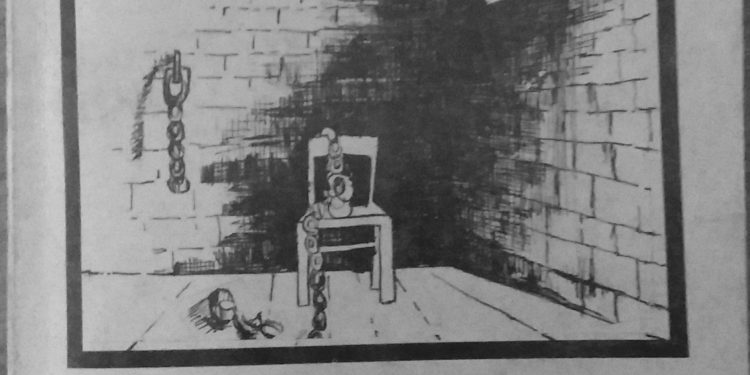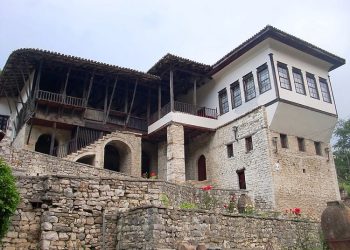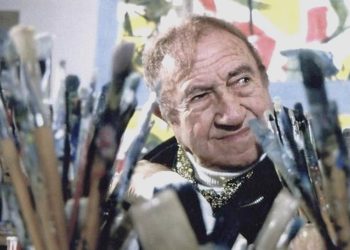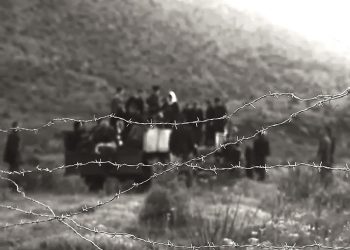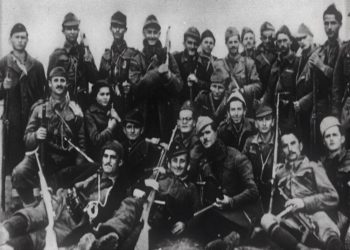By Nazmi Berish (Dyzi)
Part eight
Memorie.al publishes the unknown story of Nazmi Berisha, originally from the village of Llap in the Municipality of Podujeva in Kosovo, who was seduced by the propaganda of the communist regime and the programs provided by Radio Tirana for “socialist prosperity” and escaping the rank-and-file methods of the Titoist regime, in 1960, he decided to flee and came to Albania, crossing the Buna River by swimming in the great cold of that harsh winter. Rare testimonies of Nazmi Berisha, how he was received in his homeland, where the soldiers and border officers of the Shkodra district, after tying him with wire, sent him to the Internal Affairs Branch, where for 24 hours they did not even give him bread for eaten, and then sent to the town of Shijak where was the “Filtering Center” of Kosovar emigrants. The whole adventure of the 20-year-old boy from Kosovo that the State Security accused of: being a UDB agent, who had sent on a secret mission, Cedo Topallovic, the president of the UDB for Kosovo, to meet with the Rear Admiral of the Fleet, Teme Sejko and the inhuman tortures inflicted on him in the Internal Affairs Branches of Lushnja, Kruja, Tirana, etc., where he was kept isolated and asked to become a collaborator of the State Security, bringing out as witnesses, his compatriots from Kosovo, and his refusal, which made him spend a full 20 years in the prisons of the communist regime of Enver Hoxha. The articles published by Memorie.al, have been selected from his book, ’20 years in Enver Hoxha’s prisons’ published by the Publishing House “UEGEN”, Berat, 1995.
Note to the editor and publisher
Evidence of civic courage, living testimony of a completely heartless human suffering, an archive that is valid for today and tomorrow.
Prison scenes run in front of you, honest and cannibalistic characters, ordinary people and you remain stunned by such a low action, so without dignity and profane of the communist administration.
20 years in Enver Hoxha’s communist prisons! The author never equates the dictator with Albania. The total disappointment of a guy who ran towards the star of his love, is not obscured. Everyone had almost the same fate. An unparalleled patience, an unwavering will of a diverse psychology full of dramatic colors, a monstrous fatigue.
Here is this book by Nazmi Berisha.
The characters are real.
Let each one prays to the God of truth.
Xhevahir Lleshi
Continues from the last number
Rexhep Shabani from Dibra e Madhe, was there. Came in the ‘50s. They had taken him from Tirana to Çermë, for agitation and propaganda. He had said that once Bey rode a horse, today the mayor rides a motorcycle, once the prefect left in a car, today the first secretary left in a luxury car. Was he lying? Golden cut with 10 years in prison. Rajko Simonovic, who came to Albania in 1948 from Montenegro, had worked for some time as an adviser to Kadri Hazbi. He later got married in Elbasan, where he also had a daughter. The day came and for him, the Yugoslav spy! 10 years in prison. He was serving his sentence in vain. There was another Montenegrin, Simo Markovic from Gjakova. He had tried Llakatund as a prison prelude. Released in 1956 and receives a letter from his friend Jovica Cervenko, he goes to the Yugoslav embassy. There they photocopy the letter and publish it in Borba. Jovica is sentenced to 20 years in prison, while Simo is taken to Berat to work and live. In 1974 he was arrested accused of being a Yugoslav agent. He was sentenced to 25 years in prison, and there was even talk of a network of him.
Hysen Bukoshi, imprisoned after Simo, came to Albania in 1969. He and Ali Boletini, Isa’s nephew, had an interesting biography. Did Hyseni meet Simon in Berat? The Security knew this. Hysen Bukoshi was arrested in Prizren, together with Adem Demaçi’s group. They take them to Nis prison. He knew Hilmi Rakovica and he agreed with me. Hyseni told me about Sabri Novosela, about the writer Teki Dervishi, about the tortures against Fazli Graicevci who wrote articles in ‘Jeta e Re’. Time proved that he was an inflexible martyr. Unheard of game of dishonesty. To the Serbian occupiers, it worked, but to the Albanian occupiers themselves, it might seem like idiocy. The truth about Fazli Graicevci was told by the young Sabri Berisha, who had hit his teacher with an ax, for a serious insult to Albanians. Sabri’s own story, as was the unyielding life of Fazli Graicevci and Hysen Bukoshi. The story of a prisoner has great drama. So was Hysen’s life. To listen to the work of Besnik Koçi from Gjakova, imprisoned in 1957, and not to write about him waving red and black flags in the city, on the day of his wedding? What about Hysen Dobruna, who after being sentenced to 7 years with Demaçi, gets out of prison and at his wedding with 300 people waves the Albanian flag. 35 people from that wedding fled to Albania.
Berat becomes the first mandatory shelter for Hysen Bukoshi. He marries a local girl and they have two children. A righteous man of faith, he gains authority as a patriotic teacher. But could the red dictatorship of Tirana endure this?! There is a pretext for the visit of Kosovar patriots who meet Hyseni. Then urgently in jail. Witnesses: Sima Markovic. Oh God, Hyseni was imprisoned in Kosovo for expressing ethnic Albania. In Albania, he is imprisoned for the same reason. Kosovar irredentism was condemned in his homeland as well. The head of the Berat branch had told Hysen openly. It was not easy to seek nationalism for the homeland. He was sentenced to 4 years in Yugoslavia and 10 years in Albania. Evil has nowhere to go. With Hysen I would serve my sentence in Ballsh. His family with forced labor on the farm. The wife and children came often. He was a true patriot. Injustice to him was the living paradox is perhaps the classic dishonesty demanded by the great tragedians. Will the tragedies of Albania be written?
Idriz Zeqiri from Istog was imprisoned in 1973, and was a friend of Xhafer Shatri, who came to Albania in 1963. He had started for Language and Literature in Tirana. In recent years, he has been arrested by the Security and Kadri Ismailati, the sadistic chief of Tirana, joined the Bajrami group from Gjilan. In the dungeons of Tirana, torture, but new. A criminal trap for them. Poor Idrizi distributed economic aid in income and clothing to people for charity. Investigators asked him about this and he told them that he was sharing the misery. Put in defense of Kapllan Resuli and Myrteza Bajraktari. The trial screams and he is sentenced to 10 years in prison. Do I need them anymore?! Idrizi, isolated in Berat, met the linguist Selman Riza. Security asks him what he thought of her. Idrizi was imprisoned for three things, the first for contact with Kosovars, the second for staying in Tirana, the third for Selman Riza. Two false witnesses badly tortured and testify about it. They knew nothing. This was the classic honesty of the pure socialist state of the colossus Enver Hoxha.
Abdulla Zagora from Shkodra, imprisoned in the ‘70s. He is imprisoned by Yugoslavs in Sarajevo for participating in a Muslim organization. After 10 years he is released from the infamous Sremska Mitrovica and comes to Albania ostensibly with citizenship. The Albanian authorities released him for a while in Shkodra, and then sentenced him to 10 years in prison for propaganda agitation. The black Abdullah did not understand why he was convicted. For the Albanian Bolsheviks, a religious like him was a danger to his free speech.
Shefqet Kaçaniku from Prizren, biology teacher. Comes in the ‘60s in Lezha. In the ‘70s, many of his intellectual friends come. Security was watching everyone. This was the best case for her, as the ALP did not tolerate its authority being scratched at all. 10 years in prison for propaganda agitation. Related to Shefqet’s fate was Esat Myftari from Peja. A former journalist of “Rilindja”, a student in Belgrade, came to Albania in 1963. When Shefqeti was arrested, he protested against this injustice, and accused the dictator of not respecting the Constitution. Esat is also arrested and sentenced to 10 years in prison. He had been convicted in absentia in Yugoslavia for his patriotic activity. I heard that he was married to Shefqet’s daughter.
The tragedy in itself is the story of my friend, Zeqir Rashica from Vushtrri. At the age of 60 he was sentenced to 10 years for propaganda agitation. Zeqiri was a patriot, righteous and for this reason he was put in charge of the Trepca miners’ union. Imprisoned in Nis. There he meets Isuf Visoka, the son of the patriot Hoxha Visoka, and Hoxha Marevci, imprisoned by the Yugoslavs. They were together with Adem Demaçi. An amnesty was then granted in Yugoslavia, and the three were released. In 1964, the three of them, together with Jetulla Gashi, fled to Albania. They come to Elbasan. Hoxha Marevci goes to Kadri Hazbiu and arranges the right to study Jetulla for Medicine. Meanwhile, Security imprisons Aziz Zhilivoda, who came to Albania in the ’40s. Accused of propaganda agitation in favor of Yugoslavia. Because he had asked his son for a coat.
His witnesses were Hoxha Marevci, Isuf Visoka, and Zeqir Rashica. There is no place for shame and evil. I put all three in the Security bag. Of course, they lied to him, telling him that Aziz was in favor of Fadil Hoxha and UDB. No one tortured the three of them, so they loved the homeland. And there is no greater dilemma. Where Albania and where Azizi! And he is sentenced to 10 years in prison. He carried them out in Ballsh and shortly afterwards, his witnesses were arrested. Aziz did not talk to them at all, because he treated them like Security spies. Kollaj fare. For the sake of Albania, you should be declared a spy of Yugoslavia. Because we know very well who you are. But let us set aside the narrow interests and look at the interests of Albania.
They fall into the filthy trap of love for their homeland. A severe ordeal and great spiritual struggle. The idea of Albania triumphs in their soul. Classic dishonesty worthy of tragedy, write to the younger generations your most stigmatized criminal face. Do not forget to monologue and the duel of good and evil in the souls of those people. Hoxha Marevci, sentenced to 15 years in Yugoslav prisons, lost sight of the udbas for his heroic attitude and had become a legend for his martyrdom. Now he had to be inserted like a living corpse into the white shroud. But can one grasp what war his soul has had between Albania and the accusation as an agent of Yugoslavia? I do not believe it.
How did Isuf Visoka and Jetullah Gashi experience their situation? How badly the regime treated your feelings and dignity. What is the value of further life?! Of course, that war continued with incredibly long and tedious sessions. (Peter Arbnori had told me the story of Stalin’s pipe, which was allegedly lost on Easter and found on the couch by Stalin himself. and Stalin’s answer: “Yes, is there no silage pit?” And Beria’s fantasy had continued….) Every story of the prisoners around me, along with my fate, seemed to me like that of Stalin!
It is understood that each of them is sentenced to 10 years for… agitation and propaganda.
Meanwhile, Zeqir Rashica is not imprisoned. Married to an Elbasan woman, although he had left his wife and daughter in Kosovo, visitors from Kosovo start coming to him. It is reported that his brothers were arrested, tortured and that he was already awaiting death. Learns about the hysterical mistreatment of Albanians. He does not believe in the arrests of Hoxha, Isuf and Jetullah. Maybe some mistake! So, comes his day. Arrest. Agent! Show! Group. Connections with Hoxha, Isuf, Jetullahu. The mayor? Zeqiri laughed badly. Beating. Saliva. Shkelma. He had to accept torture with everyone, but to break the bones of the Security, to make a fuss! Electric current, cement without food, without water, without Tesha, connected with German bars!
O God! Zeqir Rashica did not give the floor. Zeqiri’s life was the word and he never uttered it. Let him die! But even the Security considered it unnecessary and not to say the word, trial. The first witness is Jetullah Gashi, who states that: not this process, but everyone has been subjected to violence. We have declared with violence, while Zeqiri is a patriot. But they could not let him finish. Hoxha and Isufi were not invited. The sentence was not harsh by the “puppets” the court. Zeqiri was constantly lying down for ten years. Even friends, while Jetullahu, 15 years. He eagerly awaited death every day. He had lost everything, except the love for Albania. And this is not a slogan. But does dishonesty have the power, even modern, to understand the soul of an ardent patriot?!
While it took me almost a year to be released, the incident with the Operative also happens to me. George. During the appeal he says to me: You are a Titoist, because you are not entering the line quickly! And I: Tito are you and your companions, while I neither fought with Tito, nor did I know him, you have the chatter! The guards, the directorate, George’s statement: you will pay me dearly. My previous arrest, I had fallen into their own hands. Gjergji plotted to beat me by Adem Muja and a certain Zeneli from Ulcinj to the barber Alaudin Kapo, but since Hysen Bukoshi and Jahir were shot there, I escaped in peace. I would eat it a month dungeon and Jahari, 15 days. I had time to quarrel with myself, rummaging through the days to come. He did not drink water or a revolver or anything else. I was depressed, although I had the help of friends and especially Hysen and Esat. But I went through it in my mind. Hysni Kapo had died and that the word slandered by Zenel Ulqinaku was circulating, that they will all die, that the communists are vile, that this is a bloody power. Zenel was badly attacked and he had asked the directorate to release him, because it was his own fault. Meanwhile, Huseni and Esat write a letter to Enver Hoxha, but in vain. Dishonesty was sitting cross-legged. She was writing a new process.
Pyrrho’s victory, my third trial at Ballsh
Just on the 29th of the biriuca, the guard comes and takes me to shave and, as he says, to “cut my suit”. D.m.th., I would be judged. I waited calmly. I was prepared. I had never been so calm, while from the inside I was boiling. They remembered that this was a surprise, but no, I knew their logic well. One judge, two assistants, two witnesses and points were enough! Put the party right away.
Farsa started without ceremony. Judicial panel, investigator, chairman, two Security officers, sideways, two police officers and the secretary. I had to stand up. Paskësha injured Zenel and that he made agitation and propaganda against the Albanian state. My protest was dry, like the detonation of one of the machine gun units. Meanwhile I sit down and they order me to get up, but could I? Let the cops hold me by the arms, and so it happened. The investigator-judge noted that this trial had the duty to find the truth and not to convict an innocent person. Had the letter addressed to Enver worked?! Or was it just an insecurity?!
The first to testify is Alaudin Kapo. Straight. Without mentioning names, as it happened, insidious, hanging on their hook of justice…! Hyseni, guard Ademi, was called. The mayor testified, but did not say that I was against the state. Prita? Maybe en Zeneli, I testify that he had nothing to do with me, that he was pushed and hugged me. She cried like a child. Meanwhile, Hysen Bukoshi rises, brave and righteous like him. It was happening, something unusual in the courts of Albania! He pointed out that the wounds received in the prisons of Yugoslavia had not yet dried up and that is why, because he loved Albania, new graves were opened. He declared in the greatest moral and patriotic responsibility, the innocence of Nazmi Berisha and that I was a victim of Gjergji and his friends. He spoke as much as he should and for what he should. He was shocked and spoke with a natural protest. He had everything he did and not that it had anything to do with me.
The judge declared the trial closed. Nazmi Berisha, for lack of facts, acquits innocence. Everyone hugged me, except Adam. A really touching scene, was this a victory, but a victory like Pyrrhus!? The symbol of victory was essentially the opposition to the classic ten years of sentences for agitation and propaganda. However, my gratitude for this victory fell on two men: Hysen Bukoshi and Esat Myftari. Sometime in mid-February, the guard comes and informs me and Hysen Bukushoi that we were getting ready to go to another prison. Discussions, conjectures, in short, we would have been raised…? Touching partitions. The sight of Zeqir Rashica could not be easily removed from my eyes, without moving and with tears in my eyes. A monument of which era? We fled as two victors like Pyrrho of Epirus from the Italian lands, victorious without soldiers. Father Pyrrhus had some tiles waiting for him to fall on his head, what about us? Memorie.al




